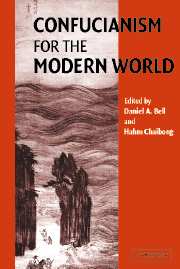Book contents
- Frontmatter
- Contents
- List of Contributing Authors
- Acknowledgments
- Editors' Note
- Introduction: The Contemporary Relevance of Confucianism
- PART I CONFUCIAN PERSPECTIVES ON DEMOCRACY
- 1 Constitutionalism, Confucian Civic Virtue, and Ritual Propriety
- 2 The Challenge of Accountability: Implications of the Censorate
- 3 Confucian Democrats in Chinese History
- 4 Mutual Help and Democracy in Korea
- 5 A Pragmatist Understanding of Confucian Democracy
- 6 The Case for Moral Education
- PART II CONFUCIAN PERSPECTIVES ON CAPITALISM
- PART III CONFUCIAN PERSPECTIVES ON LAW
- Epilogue: Why Confucius Now?
- Index
3 - Confucian Democrats in Chinese History
Published online by Cambridge University Press: 28 August 2009
- Frontmatter
- Contents
- List of Contributing Authors
- Acknowledgments
- Editors' Note
- Introduction: The Contemporary Relevance of Confucianism
- PART I CONFUCIAN PERSPECTIVES ON DEMOCRACY
- 1 Constitutionalism, Confucian Civic Virtue, and Ritual Propriety
- 2 The Challenge of Accountability: Implications of the Censorate
- 3 Confucian Democrats in Chinese History
- 4 Mutual Help and Democracy in Korea
- 5 A Pragmatist Understanding of Confucian Democracy
- 6 The Case for Moral Education
- PART II CONFUCIAN PERSPECTIVES ON CAPITALISM
- PART III CONFUCIAN PERSPECTIVES ON LAW
- Epilogue: Why Confucius Now?
- Index
Summary
INTRODUCTION: CONFUCIANISM AND DEMOCRATIZATION
Whether or not Confucianism conflicts with democracy is an important question not only for the future democratization of China but also for the future political development of other East Asian countries with a Confucian heritage. If Confucianism is consistent with democracy, the traditional culture may be used as a means of promoting democratization in East Asia. At the very least, the political transition will be smoother and easier, with lower costs, since there will be less cultural resistance. In this essay, it will be argued that Confucianism and democracy are compatible.
The compatibility of Confucianism with democracy may refer to the strong thesis that Confucianism is always supportive of democratization. Here, however, I defend the weaker thesis that Confucianism is not inherently incompatible with democracy. Put positively, it means that Confucianism is capable of embracing the idea of democracy and that it can be developed for this purpose.
There are two ways to validate or invalidate my assumption. One way is through content analysis. Scholars analyze the theoretical tenets of Confucianism and democracy to determine if they are consistent. Those sympathetic to Confucian democracy would define their terms and then try to reveal some elements in Confucianism that can support, or at least be consistent with, some elements of democracy. Although this method seems reasonable, it has provoked endless debates.
- Type
- Chapter
- Information
- Confucianism for the Modern World , pp. 69 - 89Publisher: Cambridge University PressPrint publication year: 2003
- 5
- Cited by

